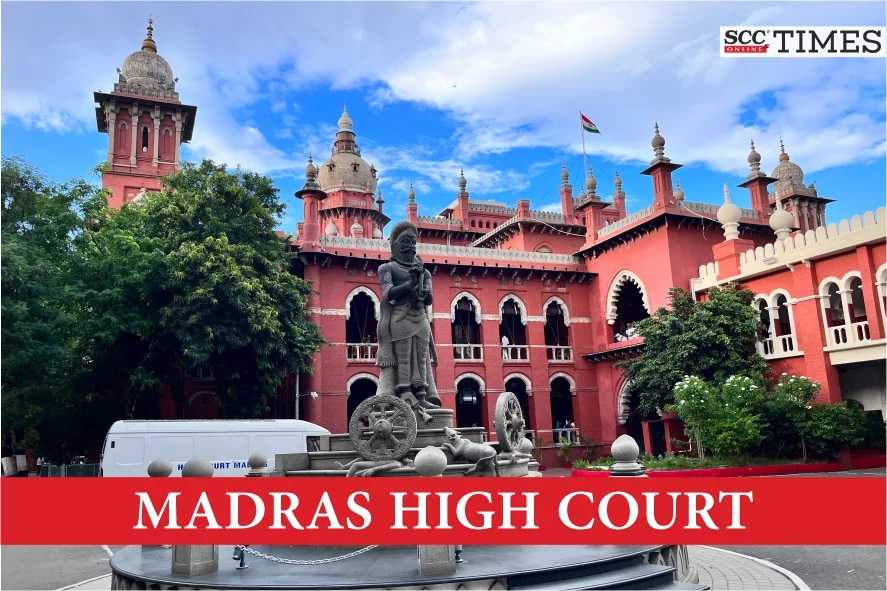Madras High Court: In a writ petition filed for directing the National Testing Agency (‘NTA’) to permit the petitioner into the examination hall by wearing diaper and permit the petitioner to change the diaper once or twice (as required) in between the time of examination i.e., 2.00 pm to 5.20 pm on the date of examination, G.R. Swaminathan, J. held that any candidate not necessarily suffering from disability set out in the Schedule to RPwD Act, 2016, but otherwise having special requirements or needs by virtue of her/his biological condition is entitled to reasonable accommodation.
Background:
The petitioner is a 19-year-old woman, who desires to appear in NEET (UG) – 2024. When she was around four years old, she was scalded by hot oil and suffered burn injuries on the face. She is taking treatment for LETM/NMO/Spectrum Disorder/Neurogenic Bladder on OPD basis. Her doctor has certified that she has lack of urine control and that she needs to wear diaper continuously which also has to be frequently changed. Therefore, she called upon the NTA to permit her to sit in the examination hall wearing diaper, and allow her to change once or twice depending on her condition. Since her representation dated 08-04-2024, she did not get any response, thus, she filed the present writ petition.
Issue: Whether the principle of reasonable accommodation should be restrictively applied and made available only to persons who fall within the scope of the RPwD Act, 2016?
Analysis:
The Court said that the Rights of Persons with Disabilities Act, 2016 (‘ RPwD Act’) was hailed by the Supreme Court as marking a paradigm shift.
After taking note of Vikash Kumar v. UPSC, (2021) 5 SCC 370, wherein it was held that though Part III of the Constitution of India does not explicitly include persons with disabilities within its protective fold, the golden triangle of Articles 14, 19 and 21 applies with full force and vigor to the disabled much like their abled-bodied counterparts.
The Court referred to Section 20(2) of the RPwD Act, which mandates that no Government establishment shall discriminate against any person with disability in any matter relating to employment, and Section 17 of the Act, which expects the appropriate government and the local authorities to take specific measures to promote and facilitate inclusive education.
The Court said that the petitioner’s apprehension could not have been dismissed as misplaced or unfounded. NEET is held all over the country every year. There is mandatory frisking to which the candidates are subjected to, which is sometimes taken to absurd limits. In Kerala, once a girl was asked to remove her inner wear.
After examining Clause 10.2 of the Information Bulletin issued by NTA, the Court noted that as this clause does not address the concerns expressed by petitioner, the present writ petition came to be filed. Further, in another notification issued by NTA, it is mentioned that diabetic students will be allowed to carry eatables like sugar tablets/fruits and transparent water bottles to the examination halls. It was also laid down that candidates will be frisked, and biometric attendance will be taken again on entry from bio break/toilet break.
The Court said that the petitioner has special needs. She is required to wear a diaper always and not just when in the examination hall. She also has to frequently change the diaper which would entail visiting the restroom. If the facilities required by the petitioner are denied, she will not be able to take the examination, which would lead to discrimination that is forbidden by Article 14 of the Constitution of India.
The Court said that once it is recognised that an eligible candidate is entitled to write a given examination, she must be placed on the same footing as any normal candidate. That is why, a disabled candidate is statutorily permitted extra time to complete the examination. If the requisite facilities are not available and the special treatment is denied, the candidate has only one option, that is to not take the test. That would necessarily constitute a grave breach of the equality mandate set out in Article 14 of the Constitution of India.
The Court further added that Article 15(3) of the Constitution enables the State to make special provision for women and children. There is no justification in restricting the principle of reasonable accommodation only to those suffering from disabilities recognised by RPwD Act, 2016. All persons having disability have special needs. That does not mean the disabled as defined in the statute alone have special needs. As per the Court, beneficial principles and doctrines must be construed and applied.
The Court suggested that every examination centre must have suitable toilet facilities with water amenities. They must keep a minimum number of sanitary products near the toilets so that any girl who has come unprepared may use them. The girl candidates must be allowed the use of rest rooms when required. The restrooms can be thoroughly inspected in advance and regularly so that there is virtually no need for frisking the candidates for the second time. This will save the candidates’ precious examination time.
The Court said that it is the duty of the authorities to spread awareness so that the candidates are not put to any stress at all. Further, the Court suggested that in the dress code, it would have been appropriate if the clause specifically permitted wearing of sanitary pads by girls. The absence of such a clause and the failure to respond to the petitioner’s representation led to the filing of this writ petition.
Thus, the Court directed the examination authorities to bear the special needs of girls in mind and provide reasonable accommodation.
The Court held that any candidate not necessarily suffering from disability set out in the Schedule to RPwD Act, 2016, but otherwise having special requirements or needs by virtue of her/his biological condition is entitled to reasonable accommodation.
[Monisha v. National Testing Agency, 2024 SCC OnLine Mad 956, Order dated 26-04-2024]








